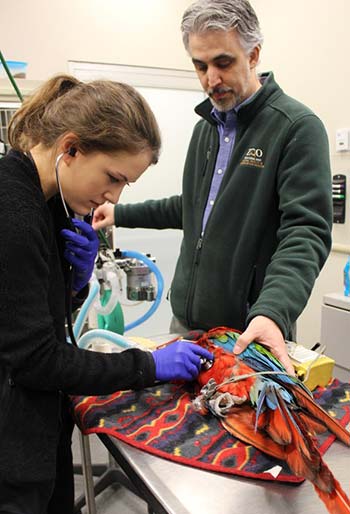 Conservation Medicine holds that the preservation of biodiversity enhances ecological health and in turn, the health of animals and humans. For over 10 years, ZNE has held a leadership role in the Panama Amphibian Rescue and Conservation Project, a multi-institutional international partnership to conserve critically endangered species of amphibians in Panama. This collaborative work focuses on rescue, treatment, captive breeding, research, and education programs developed to safeguard threatened amphibian species. Read more about the amphibian crisis and ZNE’s efforts.
Conservation Medicine holds that the preservation of biodiversity enhances ecological health and in turn, the health of animals and humans. For over 10 years, ZNE has held a leadership role in the Panama Amphibian Rescue and Conservation Project, a multi-institutional international partnership to conserve critically endangered species of amphibians in Panama. This collaborative work focuses on rescue, treatment, captive breeding, research, and education programs developed to safeguard threatened amphibian species. Read more about the amphibian crisis and ZNE’s efforts.
On a local level ZNE initiated the Franklin Park Biodiversity Project, through which native and invasive species, both plant and animal, are monitored to develop a better understanding of how they can coexist in an urban landscape. Observations are documented in seasonal surveys, providing data that can be used to protect biodiversity in the park and prevent further population declines in local wildlife. The community is invited to submit their own wildlife observations to the project using iNaturalist, and plans to involve local ecologists and biologists are underway. Read more about the project’s findings and how you can contribute your own wildlife observations.
 ZNE veterinarians also provide veterinary support to conservation projects benefitting local species, working with biologists to study and protect Blanding’s turtles and marbled salamanders for reintroduction in the wild. ZNE gives these threatened reptiles and amphibians a “head-start” by raising them in the Zoo until they’re old enough and large enough to better survive in the wild, and then releasing them into their native habitats.
ZNE veterinarians also provide veterinary support to conservation projects benefitting local species, working with biologists to study and protect Blanding’s turtles and marbled salamanders for reintroduction in the wild. ZNE gives these threatened reptiles and amphibians a “head-start” by raising them in the Zoo until they’re old enough and large enough to better survive in the wild, and then releasing them into their native habitats.





